
The Newton International Fellowship, named after Sir Isaac Newton, is an international postdoctoral award for selected foreign academics to carry out research at institutions in the United Kingdom.

The Newton International Fellowship, named after Sir Isaac Newton, is an international postdoctoral award for selected foreign academics to carry out research at institutions in the United Kingdom.
Established by the Royal Society, British Academy, and Royal Academy of Engineering, the Fellowships are awarded annually to approximately 25 of the most outstanding early career academics from across the world, in all disciplines of the sciences and humanities. Key objectives of the Newton Fellowship are to bring the best early career academics to the UK and to enhance ties between these academics’ home countries and the UK. [1] Newton Fellows are fully funded for a period of three years and awarded coverage of research expenses up to £8,000 per year, with a maximum award value since 2023 of £420,000. [2] This award is intended to facilitate the development of a continuous research program and to support continued engagement with UK-based researchers. [3]
Applicants to the Fellowship must not hold UK citizenship and must be working outside the UK at the time of the application. It is required that applicants hold a PhD by the time the funding starts. Applicants should have no more than 7 years of active full-time postdoctoral experience at the time of application (discounting career breaks, but including teaching experience and/or time spent in industry). [4]
A fellow is a concept whose exact meaning depends on context. In learned or professional societies, it refers to a privileged member who is specially elected in recognition of their work and achievements. Within the context of higher educational institutions, a fellow can be a member of a highly ranked group of teachers at a particular college or university or a member of the governing body in some universities; it can also be a specially selected postgraduate student who has been appointed to a post granting a stipend, research facilities and other privileges for a fixed period in order to undertake some advanced study or research, often in return for teaching services. In the context of research and development-intensive large companies or corporations, the title "fellow" is sometimes given to a small number of senior scientists and engineers. In the context of medical education in North America, a fellow is a physician who is undergoing a supervised, sub-specialty medical training (fellowship) after having completed a specialty training program (residency).
A postdoctoral fellow, postdoctoral researcher, or simply postdoc, is a person professionally conducting research after the completion of their doctoral studies. Postdocs most commonly, but not always, have a temporary academic appointment, sometimes in preparation for an academic faculty position. According to data from the US National Science Foundation, the number of holders of PhD in biological sciences who end up in tenure track has consistently dropped from over 50% in 1973 to less than 20% in 2006. They continue their studies or carry out research and further increase expertise in a specialist subject, including integrating a team and acquiring novel skills and research methods. Postdoctoral research is often considered essential while advancing the scholarly mission of the host institution; it is expected to produce relevant publications in peer-reviewed academic journals or conferences. In some countries, postdoctoral research may lead to further formal qualifications or certification, while in other countries, it does not.

Fellowship of the Royal Society is an award granted by the Fellows of the Royal Society of London to individuals who have made a "substantial contribution to the improvement of natural knowledge, including mathematics, engineering science, and medical science".
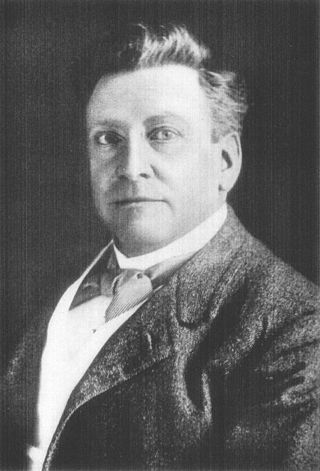
The Leverhulme Trust is a large national grant-making organisation in the United Kingdom. It was established in 1925 under the will of the 1st Viscount Leverhulme (1851–1925), with the instruction that its resources should be used to cover certain trade charities and support "scholarships for the purposes of research and education." Over time, it has come to focus on the latter aim.
The National Multiple Sclerosis Society (NMSS) is an American nonprofit organization founded in 1946. It is an organization dedicated to supporting individuals affected by multiple sclerosis (MS) and funding research to find a cure for the disease. They provide resources, support services, advocacy efforts, and educational programs to improve the lives of people with MS and their families.
The Royal Society Wolfson Research Merit Award was an award made by the Royal Society from 2000 to 2020.
The National Science Foundation Graduate Research Fellowship Program (NSF-GRFP) is a grant awarded annually by the National Science Foundation to approximately 2,000 students pursuing research-based Master's and doctoral degrees in the natural, social, and engineering sciences at US institutions. As of 2024, the fellowship provides an honorarium of $16,000 to be placed towards the cost of tuition and fees at the university the fellow attends; it also awards the student directly with an annual $37,000 stipend for three years, leading to an anticipated total award amount of $159,000.
Sir John Stewart Savill, FRS, FMedSci is the Chief Executive of the Medical Research Council (MRC) in the UK and the Head of the College of Medicine and Veterinary Medicine and a Vice Principal of the University of Edinburgh.
Brigid L. M. Hogan FRS is a British developmental biologist noted for her contributions to mammalian development, stem cell research and transgenic technology and techniques. She is currently a Professor in the Department of Cell Biology at Duke University, Born in the UK, she became an American citizen in 2000.
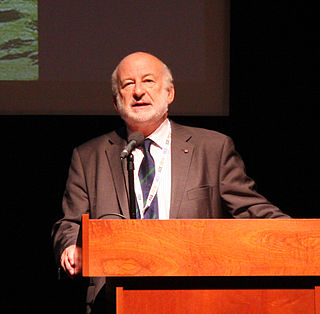
John Anthony Pickett CBE DSC FRS FLSW is a British chemist who is noted for his work on insect pheromones. Pickett is Professor of Biological Chemistry in the School of Chemistry at Cardiff University. He previously served as the Michael Elliott Distinguished Research Fellow at Rothamsted Research.
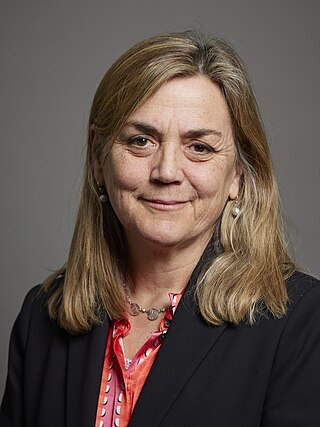
Katherine Jane Willis, Baroness Willis of Summertown, is a British biologist, academic and life peer, who studies the relationship between long-term ecosystem dynamics and environmental change. She is Professor of Biodiversity in the Department of Biology and Pro-Vice-Chancellor at the University of Oxford, and an adjunct professor in biology at the University of Bergen. In 2018 she was elected Principal of St Edmund Hall, and took up the position from 1 October. She held the Tasso Leventis Chair of Biodiversity at Oxford and was founding Director, now Associate Director, of the Biodiversity Institute Oxford. Willis was Director of Science at the Royal Botanic Gardens, Kew from 2013 to 2018. Her nomination by the House of Lords Appointments Commission as a crossbench life peer was announced on 17 May 2022.

Benjamin Guy Davis is Professor of Chemical biology in the Department of Pharmacology and a member of the Faculty in the Department of Chemistry at the University of Oxford and a Fellow of Pembroke College, Oxford. He holds the role of Science Director for Next Generation Chemistry (2019-2024) and Deputy Director (2020-) at the Rosalind Franklin Institute.

Sharon Elizabeth Marie Ashbrook is a Professor of Physical Chemistry at the University of St Andrews. Her research is focused on the application of multinuclear solid-state NMR spectroscopy techniques as well as the combination of these techniques with first-principles calculations to investigate structure, order and dynamics of solid state materials.

Eugenia Eduardovna Kumacheva is a University Professor and Distinguished Professor of Chemistry at the University of Toronto. Her research interests span across the fields of fundamental and applied polymers science, nanotechnology, microfluidics, and interface chemistry. She was awarded the L'Oréal-UNESCO Awards for Women in Science in 2008 "for the design and development of new materials with many applications including targeted drug delivery for cancer treatments and materials for high density optical data storage". In 2011, she published a book on the Microfluidic Reactors for Polymer Particles co-authored with Piotr Garstecki. She is Canadian Research Chair in Advanced Polymer Materials. She is Fellow of the Royal Society (FRS) and a Fellow of the Royal Society of Canada (FRSC).
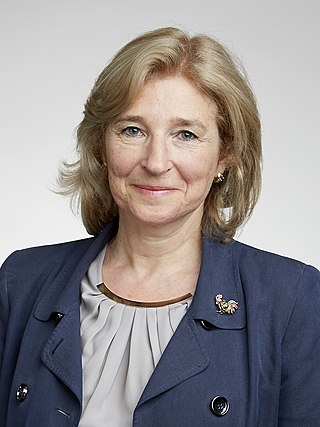
Polina Leopoldovna Bayvel is a British engineer and academic. She is currently Professor of Optical Communications & Networks in the Department of Electronic and Electrical Engineering at University College London. She has made major contributions to the investigation and design of high-bandwidth multiwavelength optical networking.
The Royal Society University Research Fellowship (URF) is a research fellowship awarded to outstanding early career scientists in the United Kingdom who are judged by the Royal Society to have the potential to become leaders in their field. The research fellowship funds all areas of research in natural science including life sciences, physical sciences and engineering, but excluding clinical medicine.
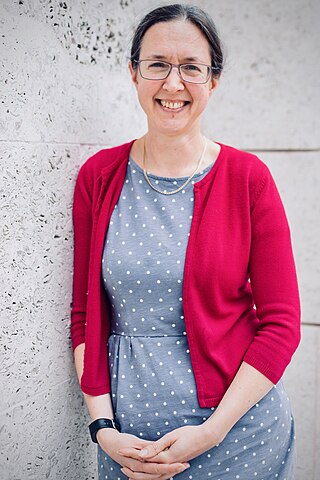
Rachel Angharad Oliver is a Professor of Materials Science at the University of Cambridge and a fellow of Robinson College, Cambridge. She works on characterisation techniques for gallium nitride materials for dark-emitting diodes and laser diodes.

Nguyễn Thị Kim Thanh is a professor of Nanomaterials at University College London. She was awarded the 2019 Royal Society Rosalind Franklin Award for her research and efforts toward gender equality.

Elena Besley is a British scientist who is Professor of Theoretical and Computational Chemistry at the University of Nottingham. She holds a Royal Society Wolfson Fellowship and is Associate Editor of Nano Letters.

A Junior Research Fellowship (JRF), sometimes known as a Research Fellowship or Fellow by Examination, is a postdoctoral fellowship for early-career scholars and recent PhD/DPhil graduates at the University of Oxford and the University of Cambridge. JRFs are among the most highly competitive, prestigious postdoctoral fellowships in the United Kingdom. The fellowships are also seen as direct pathways to tenure-track positions.